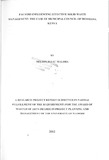| dc.description.abstract | The management of municipal solid waste has become a problem in Mombasa. This is easily identified by the persistent heaps of uncollected waste found on the street sides or ubiquitous illegal dumps. The purpose of the study was to determine the factors influencing effective solid waste management in Municipal Council of Mombasa. In order to improve the strategy for managing solid waste, a better understanding of both technological and managerial aspects is needed. While various reports, projects and policy documents on the subject of solid waste management are available, the factors affecting effective solid waste management tends to be overlooked.
The study focused on technology, availability of financial resources, community participation and the policies affecting solid waste management by the Municipal Council of Mombasa. The sample of this study consisted of 140 respondents; 94 of whom were randomly selected household heads drawn from Kisauni, Mvita, Changamwe and Likoni divisions in Mombasa County and 16 were purposelessly selected key informants from the Municipal Council of Mombasa, National Environment Management Authority, Community Based Organizations, Private waste collection companies and key businesses within the city. The data was primarily collected through questionnaires and interviews respectively. Analysis of the data was done using descriptive statistics which included frequencies and percentages.
Cross tabulations and chi square tests were also done to show the relationship between various variables and test the significance of the solid waste management variables respectively. The findings reveal that technology influences the effectiveness of solid waste management with the test statistic given as X2 (2) = 48.833, P ~ 0.05, indicating that there is a relationship between technology and effective solid waste management. The results show that there are variations in planning, development and operations in the choice of technology adopted by MCM with lack of formal recycling, recovery efforts and the collection rate being inadequate with only 61.7% of wastes being collected. Secondly the results show that the availability of financial resources influence effective solid waste management with the test statistic given as X2 (2) = 38.759, p ~ 0.05, indicating that there is a relative significant relationship between financial resources and effective solid waste management.
The results reveal that there is an almost universal conviction that MCM should provide waste collection service without charging directly for it. Thirdly, the results reveal that community participation influences the effectiveness of solid waste management with the test statistic given as X2 (2) = 13.408, p ~ 0.05, indicating that there is a less significant relationship between community participation and effective solid waste management. The results show that 57.4% of the respondents were aware about the environmental problems associated with indiscriminate dumping but do not care whether their wastes are dumped illegally or taken to an approved disposal site, provided that it is taken out of their immediate neighbourhood .
Finally the results show that policies influence effective solid waste management, however there are shortfalls in the legislation which have led to limited human and financial capacity to enforce legislation and an uncoordinated enforcement by NEMA and the Council without clear defined roles and responsibilities. In conclusion there is an urgent need for the enhancement of community initiatives and partnerships by the MCM to increase awareness of the importance of solid waste management and its contribution to a healthy living environment. This study recommends the formulation of an efficient urban solid waste management with participation from the public, private and the community through an integrated solid waste management system. | en_US |

